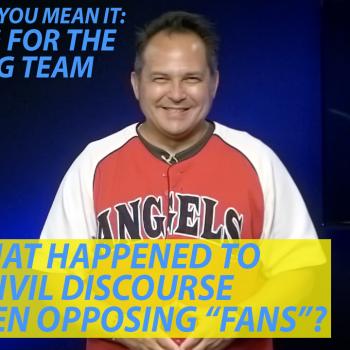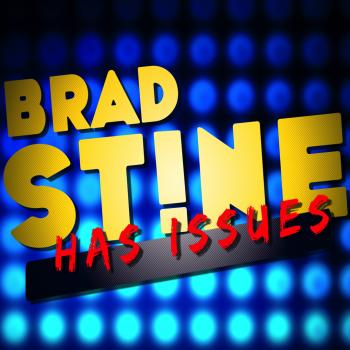
Dr. Craig listens to excerpts from a debate between a Classical and a Presuppositional apologist.
 Reasonable Faith Podcast: The Debate on Apologetic Methodology Part 1 Play Now | Play in Popup | Download
Reasonable Faith Podcast: The Debate on Apologetic Methodology Part 1 Play Now | Play in Popup | DownloadKEVIN HARRIS: Always good to have you join us on Reasonable Faith with Dr. William Lane Craig. It is Kevin Harris. We’ve talked about doing a podcast on this topic today for a long time – classical or evidential apologetics versus presuppositional apologetics. Even if you are only mildly interested in the difference between the various apologetics methods, stay locked into this series because it is pretty interesting. Better than that, Dr. Craig’s reaction to these debate excerpts that we’ll play for you is pretty interesting, too.
 Recently I have become acquainted with Eric Hernandez of EricHernandezMinistries.com and seen him do good work in philosophy and apologetics and debates, but he really had his work cut out for him in this debate dialogue with Sye Ten Bruggencate. Many would consider Sye rather notorious in his interactions on YouTube and debates with atheists and so on in which he employs a highly developed system of presuppositional apologetics. If you don’t know what presuppositional apologetics are, that should become clearer as you listen to the next couple of podcasts. So stay close.
Recently I have become acquainted with Eric Hernandez of EricHernandezMinistries.com and seen him do good work in philosophy and apologetics and debates, but he really had his work cut out for him in this debate dialogue with Sye Ten Bruggencate. Many would consider Sye rather notorious in his interactions on YouTube and debates with atheists and so on in which he employs a highly developed system of presuppositional apologetics. If you don’t know what presuppositional apologetics are, that should become clearer as you listen to the next couple of podcasts. So stay close.
Eric embraces a more classical or evidential approach to apologetics. Sye Ten Bruggencate is pre-sup – “mega-pre-sup” as we say in the business [laughter]. This was a chance for the two of them to contrast the ideas. It was hosted by the pastor of First Evangelical Lutheran Church of Houston, Evan McClanahan, who has a radio show and a podcast called Sin Boldly. Now, I have to say a word about that. Why would a pastor call his show Sin Boldly? It comes from something that Martin Luther wrote in a letter, and many people are puzzled over what Luther meant by “sin boldly.” In a nutshell, most think he was saying that we should own our sinfulness and that we need to realize we cannot earn our salvation. That’s probably what he meant.
Let’s get to part one of this podcast. I was in the studio with Dr. Craig not long ago as we discussed this debate:
Bill, we don’t talk too much about the different apologetic methods on the podcast because we are just excited if anybody is interested in philosophy and apologetics at all and learns to use them and learns to defend the faith! But there are various methods that people employ, and occasionally they kind of clash as to which one is the best. There was a debate that I recently ran into between a young man who really is more of a Biola guy and is a real follower of yours and then a presuppositional apologist who is quite famous for his very vigorous interactions on YouTube and debates and in public where he uses strictly a presuppositional method. I thought we would listen to some clips from a debate that they had (they used you as kind of a model in order to make their points) and get you to interact with the two methods – which method you think is best – and maybe we can get a handle on what presuppositionalism is as it goes.
DR. WILLIAM LANE CRAIG: All right.
KEVIN HARRIS: Here is Eric Hernandez first, who is an evidentialist. He lays out his case for evidentialism.
ERIC HERNANDEZ: First of all I do believe that it’s a method that’s used in the Bible. We see that Paul, whenever he’s talking with . . . well, he says I became all things to all men so when you see Paul addressing people dependent upon their beliefs he talks to them in regards to something they can relate to. He often quotes philosophers and poets. Sometimes I hear a pre-sup say that you should always verify things through Scripture but here Paul in many places doesn’t use Scripture. So Scripture itself doesn’t always use Scripture.
I want to point out a quick difference between knowing that Christianity is true and showing that Christianity is true. When I’m talking to someone we’re talking about a belief, not about how they feel about it or whether or not they want God to exist. We’re talking about the validity of a claim. So we want to show that Christianity is true. When we do this we’re basically giving arguments and reasons because, again, we’re dealing with someone’s truth claim, if you will. What we want to do is we want to give valid arguments and evidences. In 2 Corinthians, when someone brings up accusations or anything like that against the knowledge of God, we are to destroy them. The Bible says in Peter that we’re supposed to give a logical defense of what we believe, and of course the greatest commandment tells us to love God with all our minds which is our faculty and intellect of understanding. So when we’re engaging with unbelievers we’re called to address the questions that they have, and not all of these questions could be answered perhaps with using the Bible. Now that’s not to say that I don’t employ principles of the Bible. As I said on the last show, the beautiful thing about truth is that you don’t need to quote a verse verbatim or quote the chapter and reference in order to claim that something’s true. Truth existed before the Bible existed, so truth is essentially what we’re going after – does God exist? Is there a soul? What is consciousness? Is there life after death? Questions like that.
So when we address [or] talk to an unbeliever, even a Christian . . . classical apologetics is not just for engaging unbelievers. Sometimes people introduce me as a guy who debates atheists, and I kind of cringe at that because that’s not what I set out to do. First and foremost the greatest commandment tells us, like I said, to love God with your mind. When I approach any topic I want to glorify God in what I do. Whether I’m lifting up my hands to worship or I’m lifting up a book to read to grow in knowledge of God they are both affirmations of glorifying God and loving God. When we’re talking, again whether it’s an unbeliever (even a Christian – Sye and I are both Christians) we want to be accurate in what we’re saying. We want to glorify God. In the beginning was the Logos, so everything that God does is going to be logical, it’s going to be sound, it’s going to be valid. So I would say it follows then that if you have a belief that is illogical or invalid or not sound then it cannot be from God. All truth comes from God so if someone is being illogical they are not glorifying God.
We should be very careful in everything that we do including our apologetics. That takes rigorous thinking. That takes analytical philosophy. That takes theology. That takes Scripture. We take a holistic approach and say that we want to use every arsenal that we can to glorify God, to bring people to Christ, to do our best to be representatives of an infinite God. Though we are finite minds, we want to reflect his glory. We want to reflect his image. We want to do the best we can to the best of our abilities to continually grow, to continually help each other, as I said even with Christians. There’s a verse where you see someone says, Lord, I believe but help me in my unbelief. So we can grow in degrees of knowledge. We can be more confident or less confident in something. What I find useful about apologetics that there’s times where I have emotional doubt but I can always go back to what Scripture says or what I know to be true because I shouldn’t always go by my emotions. If something’s true, my emotions or how I feel about it becomes completely irrelevant to whether or not I know something to be true. If I know something to be true, even in times of doubt, in struggle, in similar areas I know that God is faithful, I know who he is (he’s the maximally greatest conceivable being that could possibly exist), and all these attributes that I’ve learned about God I can implement into my philosophy, my theology, and my Christian walk.
KEVIN HARRIS: OK. So that is his case. That sounds like Biola!
DR. CRAIG:Yes, I resonated very much with what he said. The only thing I would have to add is, with regard to this distinction between knowing my faith to be true and showing it to be true, he discussed showing our faith to be true by the use of argument and evidence. This is the task of apologetics. He left behind knowing our faith to be true. I would simply want to add to that that the way in which we know our faith to be true is primarily through the witness of the Holy Spirit. We are not primarily dependent upon arguments and evidence for knowing Christianity to be true. Rather, God bears immediate witness to us by his own authority that our Christian faith is true. Arguments and evidence are like a second line of defense that will come alongside and say,Yes, indeed, it is true, and there are good reasons to believe this. But apart from that addendum, I think that everything he said was quite correct.
KEVIN HARRIS: As I’ve said on this podcast, I can really resonate with sometimes you are in such an emotional state that you have to fall back on what you know is true. When I lost my son in a motorcycle accident – when I lost Tanner – I was in an emotional state where I had to fall back on the truth of God’s Word and the truth of the claims of Christ because the feelings were not there.
DR. CRAIG:That is not something that would separate Hernandez from the presuppositionalist. Both sides would agree with that.
KEVIN HARRIS: I would hope. Here is Sye Ten Bruggencate . He lays out presuppositional apologetic method:
SYE TEN BRUGGENCATE: First of all, because it’s a Reformed theology (a Reformed apologetic), I can’t bring anyone into the fold! I want the listeners to know (and of course both of you to know) that I used to be an evidentialist. What I, by the grace of God, was shown is that I wasn’t even representing the God that I believe in. Somebody would say that they don’t believe in God, and I would present them with evidences and I would present them with arguments to try and convince them that God exists. Scripture says in Romans chapter 1 that everyone knows that God exists and are without excuse for basically the rejection of him. By the grace of God I was shown a presuppositional methodology which I think you know is just really starting with the truth of Scripture. Jesus said, I will give you words and wisdom that your adversaries will not be able to resist or contradict. And what I find is that too many people are so deep into the science and the mathematics of it to try and refute the unbeliever when the average person is supposed to be able to defend their faith. What I found is that if you defend your faith wrong you have to be brilliant. One of the things after watching, for instance, a William Lane Craig debate – the reaction that most Christians give is, I could never do that. He is so brilliant. They listen to one of my debates and said, Oh, I can do that. He’s an idiot. The thing is we’re all supposed to be able to defend our faith but as far as the presuppositional method goes I say this is how I try to explain the difference basically between presuppositionalism and evidentialism.
DR. CRAIG:Let’s interject at this point because he said a number of things that I think are really odd. Notice that he first associated Reformed theology with this presuppositional approach. Historically, that is not the case. The original Reformed theologians in France were strong defenders of apologetics. Indeed, they thought that the way in which the Holy Spirit would commend the truth to unbelievers was through the intellect. So early Reformed theologians like Philippe de Mornay, a French apologist, had a strong emphasis upon reason as the tool the Holy Spirit would use to bring people to himself. So when Ten Bruggencate says,I can’t bring anyone into the fold, every Christian, every Arminian or non-Reformed person, would agree with that. Of course you can’t. Conversion is exclusively the work of the Holy Spirit. But the point is that the Holy Spirit uses means to bring people to himself – preaching is one of the means but so is argumentation and evidence. These are red herrings that really say nothing in favor of this presuppositional approach.
Neither does the fact that presuppositionalism doesn’t require you to be brilliant. This is really an odd reason to be a presuppositionalist – because you can be stupid and be a presuppositionalist. That is not to say that therefore this is the correct apologetic method to use. In these debates that I participated in, the goal is not to show one’s brilliance or erudition. It is to show that the objections brought by the unbeliever against the Christian faith are unsound and that there are good reasons to believe in the Christian faith. It doesn’t glorify God in the response to objections to just quote the Bible and say, Well, I don’t need to have an answer to your objections. There is no virtue in being ignorant. I don’t think that that is a legitimate commendation of the presuppositional approach either.
My theology professor, Clark Pinnock, gave us this advice. He said, We should know our subject profoundly and share it simply. Certainly our goal in sharing arguments and evidence is not to show our own brilliance. It is to commend the truth of the Gospel, and we do it as simply as we can. But when the unbeliever needs to go deeper then we are prepared. We’ve got the resources to go deeper as necessary.
KEVIN HARRIS: Can you comment on this contention I hear quite a lot that everyone believes in God according to Romans 1. Atheists will fight you tooth and nail on that.
DR. CRAIG:What Paul says there is that everyone knows that God exists but that they suppress the truth in unrighteousness. I believe that. I think that is what Scripture teaches. Interestingly enough, though, how does Paul say that they know that God exists? It is through the evidence that God has left in nature. How is this presuppositional? It is not on the basis of Scripture.
KEVIN HARRIS: If you want to fan the flames of their knowledge of God that somehow have been suppressed, you want to point them back to what God has shown.
DR. CRAIG:One might conclude that, mightn’t one? Think in the book of Acts when Paul and Barnabas arrive in Lystra. They do a miracle, and the people think that the pagan gods have come down to Earth. The priest of the temple of Zeus comes out and wants to offer sacrifice to Barnabas and Paul as gods. They say,No, no! We are humans like yourself. The God who made the heavens and the Earth has not left himself without witness, namely he is giving you fruitful seasons and times and so forth. So they thought that the evidence of the true God is what Paul says in Romans 1. He has revealed himself in nature. This provides evidence of who the true God really is.
KEVIN HARRIS: Jesus said, I will give you words and they will not be able to answer you. I’ve often wondered, when I look at that, scholarship generally says that he is talking to his immediate disciples there as to what they would go through. It might be a bit of an extrapolation to say that Jesus will give you the words against any enemy and you will confound them.
DR. CRAIG:He is certainly not talking about apologetic method. Aren’t these the words that Jesus gave in the context of what to do under persecution?
KEVIN HARRIS: Yes.
DR. CRAIG:When you are hauled before court or the council, don’t give any thought as to what you are going to say because the Holy Spirit will tell you what to say. He is talking about people who were dragged in front of Roman courts and told,Either you sacrifice incense to the Emperor or you will be killed or sacrificed to the gods or you will be tortuously executed. He said don’t worry in these kinds of situations; God will give you the strength to make a good confession.
KEVIN HARRIS: This gets better.
SYE TEN BRUGGENCATE: I say let’s take a piece of evidence, a fossil for instance. You put it between a Christian and a non-Christian. Now the Christian will look at that fossil and say, Wow! Noah’s Flood. Look, that’s clear indication for Noah’s Flood in this fossil. The unbeliever looks at that very same fossil and says millions of years. Exactly the same evidence. You’ve got PhDs on both sides. Exactly the same evidence, but they come to vastly different conclusions. Now, why is that the case? Is it because of the evidence? No, it’s not. It’s because the beliefs they take to the evidence, and they will interpret anything in that evidence according to the beliefs they take to the evidence. Christians do that. Unbelievers do that. If we see something that contradicts what the Bible tells us in evidence, we have a rescuing device. We say, Well, we don’t understand this but this must be the case because God says. If an unbeliever sees something that contradicts them like dinosaur bone soft tissue then they have a rescuing device for that – they say, I don’t know how that . . . . We have rescuing devices.
But the problem is that if you examine the evidences then you become judge of the evidence. That’s the one thing that I say to people. Where do you hear evidence most often out in the secular world or out in the world? You hear it in the court of law. So if somebody comes up to you and says, I don’t believe in God, first of all they’re blaspheming God because God says they do believe in him and we’re rejecting what God’s Word says. Most people would just ignore that and say, Well, let me give you some evidence. But evidence is given to the judge and to the jury to try and acquit the accused. That’s what the crown attorney – I’m in Canada so I guess it would be the prosecuting attorney – is trying to do. Or the defense attorney is trying to get his client off. So in this courtroom we are elevating the unbeliever into the judge’s chair. And who occupies the criminal’s box? The Lord of Glory. And we present evidences to the judge and jury to try and acquit God. Now the thing is, we can do that. God has given us wonderful evidence as far as existence, but here’s the problem. Even if you win that argument, the unbeliever is still the judge.
DR. CRAIG:I think we should interrupt at this point. I think that he is employing a prejudicial analogy here. There is no reason to think that we are talking about a criminal case in which God is the accused and the unbeliever is the judge to whom evidence is being given. Why not think of this in terms of another analogy? For example, the analogy where a person has a fatal disease and we have evidence of a cure that can help him to be cured of this fatal disease and in order to convince him to take the medicine we give him evidence of the clinical trials and medical studies that have been done that show that this is really an effective cure. We plead with him to then take the medicine and be cured. Why not use that analogy instead of this very prejudicial analogy of the criminal case?
To extend my analogy, the evidentialist would say, Here are some medical studies to convince you that the cure works. Whereas the presuppositionalist just says, It works. Take my word for it! I have authority that says this cure works, but I will give you no evidence whatsoever to try to convince you! Which is the more loving thing to do?
SYE TEN BRUGGENCATE: . . . and you’re still a judge. I think that’s an issue. That’s why it says in 1 John 2 verse 9 (I think in 19) that those who left us were never among us. Because if you leave the Christian fold and you ask an unbeliever, Why did you leave Christianity? Well, This such and such evidence showed me that Christianity was not true. I say as a Christian if there’s some evidence that is counter to my Christianity – to my view – what do I do? I lean not on my own understanding and in all my ways I acknowledge him and he will make my paths straight. I rest on the authority of God’s Word.
DR. CRAIG:Let’s interrupt there.Again, remember the distinction Hernandez drew between knowing and showing our faith to be true. He is talking here now about what do you do when you confront some defeater of your Christian faith. Do you cease to be a Christian or do you say, No, I know this to be true and I’ll look for an answer? But it doesn’t mean that your Christian faith is thrown up for grabs. That is addressing knowing your faith to be true. But in terms of showing it to be true, unless you refute the objections and the evidence brought against it, then you have not successfully made a good case for the truth of what you know to be true.
KEVIN HARRIS: OK, we’ll pick it up right there next time in part two of Reasonable Faith With Dr. William Lane Craig.
(This podcast is by Reasonable Faith / William Lane Craig. Discovered by Christian Podcast Central and our community — copyright is owned by the publisher, not Christian Podcast Central, and audio is streamed directly from their servers.)











